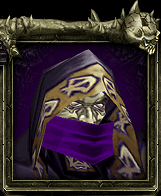I think I know what reference the speech is coming from, it comes from those Warcraft III unit workers.
Either Humans or the Undead.
Yes mi'lord! What is it! Wot? More work!?
I am bound to your will. My life for Nerzul (sp?). Where shall my blood be spilled?
Back on topic with the grammar thing: There was this study done about how a lot of people revolutionized by the internet are see and read words without having to type out the whole thing, namely due to common spelling mistakes while chatting.
[FONT=Arial, Helvetica, sans-serif]
"Aoccdrnig to a rseearchr at an Elingsh uinervtisy, it deosn't mttaer in waht oredr the ltteers in a wrod are, the olny iprmoetnt tihng is taht the frist and lsat ltteer is at the rghit pclae. The rset can be a toatl
mses and you can sitll raed it wouthit any porbelm. Tihs is bcuseae we do not raed ervey lteter by it slef but the wrod as a wlohe."
[/FONT]
I am typng here to see mybe u can undrstnd how ths intrstng mthod of chttng can actlly mke snse to you evn tho the spllng is ttlly incrrct.
wre u abl to undrstd how the prvius prgrph cld make snse?








